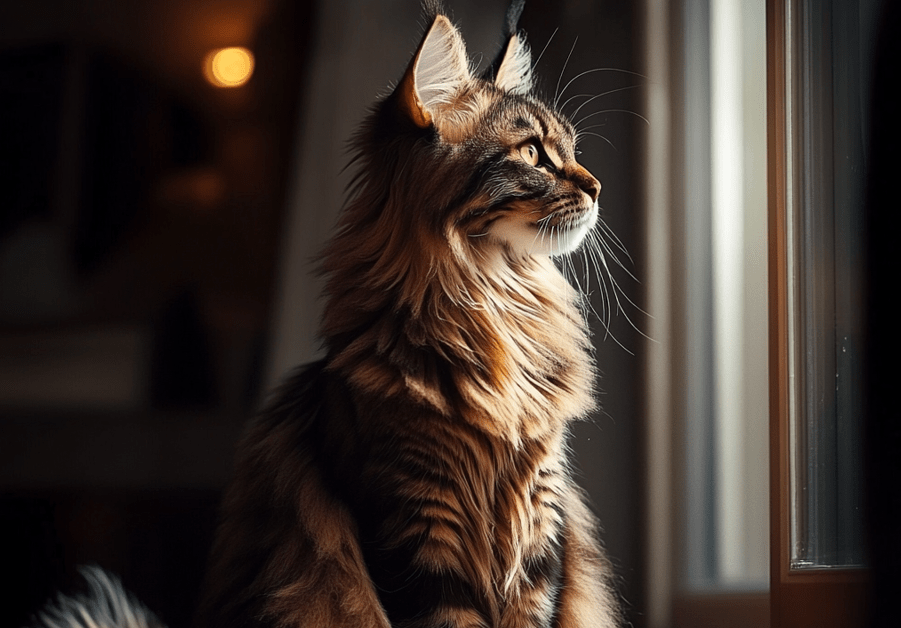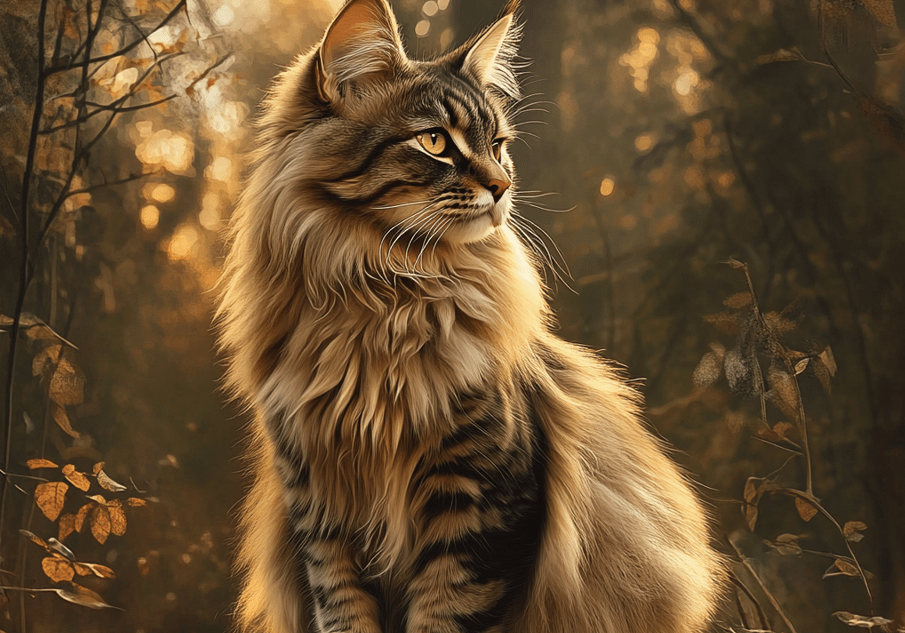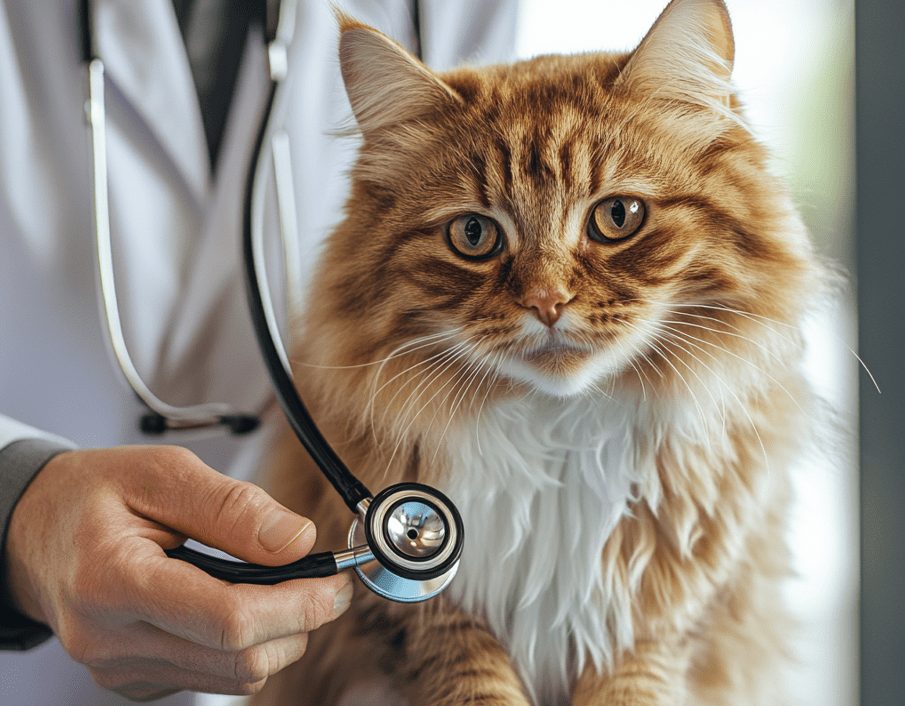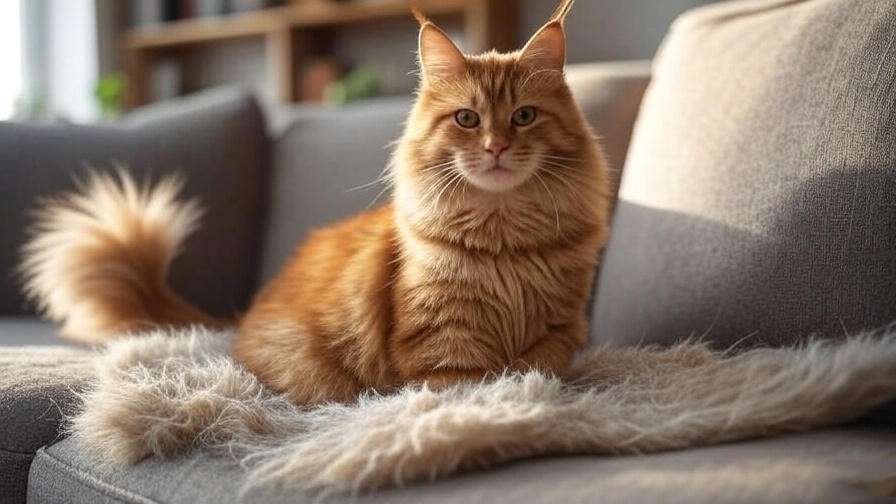
Picture this: a majestic orange Maine Coon bounds into your living room, its fiery fur catching the sunlight as it lets out a cheerful chirp, demanding your attention. These gentle giants, known for their striking appearance and dog-like devotion, steal hearts effortlessly. But owning an orange Maine Coon comes with unique responsibilities. Their vibrant coat, massive size, and playful personality require tailored care to keep them thriving. Whether you’re a new owner or a seasoned cat enthusiast, this guide dives deep into the specific needs of orange Maine Coons, offering expert-backed tips on health, grooming, nutrition, and more to ensure your feline friend lives a long, happy life.
In this comprehensive article, we’ll explore why orange Maine Coons stand out, how to address their health concerns, and practical ways to nurture their sociable nature. Drawing from veterinary insights, breeder expertise, and real-life owner experiences, this guide is your go-to resource for giving your orange Maine Coon the care they deserve.
Understanding the Orange Maine Coon
What Makes Orange Maine Coons Unique?
Orange Maine Coons, often referred to as red Maine Coons in breed standards, owe their vibrant coat to a specific genetic trait that produces pheomelanin, the pigment responsible for red and orange hues. According to Dr. Leslie Lyons, a feline geneticist at the University of Missouri, this coloration is linked to the X chromosome, making male orange Maine Coons more common due to their single X chromosome. Beyond their stunning appearance, Maine Coons are the largest domesticated cat breed, often weighing 12–18 pounds (or more!) with tufted ears, bushy tails, and a shaggy, water-repellent coat.
Their physical grandeur is matched by a personality that’s equal parts affectionate and intelligent. Owners frequently describe them as “dog-like” for their loyalty and love of interaction. For instance, a member of the Maine Coon Breeders and Fanciers Association shared a story of their orange Maine Coon, Rusty, who greets guests at the door like a canine host. This unique blend of traits makes orange Maine Coons a joy to own but also underscores the need for specialized care to match their distinct needs.
Personality Traits of Orange Maine Coons
Orange Maine Coons are renowned for their sociable and outgoing nature. Often called “gentle giants,” they thrive on human interaction and adapt well to multi-pet households. A 2023 survey by the Cat Fanciers’ Association (CFA) found that Maine Coon owners consistently rate their cats as highly affectionate and intelligent, with orange variants often being the most vocal, using chirps and trills to “talk” to their owners.
Despite myths suggesting orange cats are more prone to mischief, there’s no scientific evidence linking coat color to behavior. Instead, orange Maine Coons are typically playful and curious, with a knack for problem-solving. For example, an owner on a popular cat forum recounted how their orange Maine Coon, Tangerine, learned to open cabinet doors to retrieve toys. This intelligence demands an engaging environment, which we’ll explore later in the article.
Health Considerations for Orange Maine Coons
Common Health Issues in Maine Coons
Maine Coons, including their orange counterparts, are predisposed to certain health conditions that require vigilant care. Hypertrophic cardiomyopathy (HCM), a heart condition, is the most common, affecting up to 10% of Maine Coons, according to a study published in the Journal of Veterinary Internal Medicine. HCM thickens the heart muscle, potentially leading to heart failure if untreated. Regular echocardiograms, ideally annually, can detect early signs, allowing for timely intervention.
Other concerns include hip dysplasia, which affects joint mobility, and polycystic kidney disease (PKD), though less common in well-bred Maine Coons due to genetic screening by reputable breeders. Dr. Susan Little, a feline veterinarian and CFA judge, recommends genetic testing for HCM and PKD before adopting a Maine Coon kitten to ensure a healthy lineage. Regular vet visits, paired with a proactive approach to monitoring, can significantly extend your cat’s lifespan.
Special Health Needs for Orange Maine Coons
While coat color doesn’t directly cause health issues, orange Maine Coons may have unique considerations due to their lighter pigmentation. Lighter coats can make skin sensitivities more noticeable, particularly in cats exposed to sunlight. Dr. Alice Moon-Fanelli, a veterinary behaviorist, notes that fair-skinned cats may be prone to sunburn or skin irritation, especially on their ears and nose. If your orange Maine Coon enjoys outdoor time, apply pet-safe sunscreen and limit sun exposure during peak hours.
Additionally, some owners report that orange Maine Coons have sensitive skin, which can manifest as allergies or dermatitis. Regular checkups with a feline dermatologist can help identify triggers, such as certain foods or environmental allergens. Keeping their coat clean and free of debris is also crucial, which leads us to grooming.
Tip Box: 5 Signs Your Orange Maine Coon Needs a Vet Visit
- Lethargy or reduced playfulness
- Difficulty breathing or rapid panting
- Limping or reluctance to jump
- Excessive scratching or skin redness
- Changes in appetite or water intake
Grooming Your Orange Maine Coon
Managing Their Luxurious Coat
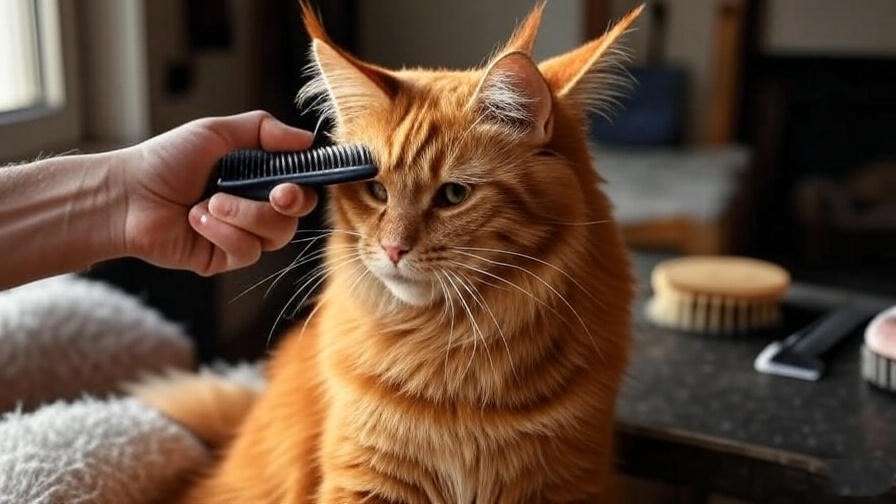
The Maine Coon’s long, shaggy coat is both a blessing and a responsibility. Orange Maine Coons, with their eye-catching fur, require regular grooming to prevent matting and reduce shedding. Brushing 2–3 times a week with a wide-tooth comb or a de-shedding tool, like the Furminator, keeps their coat tangle-free and distributes natural oils for a healthy shine. Start at the head and work toward the tail, paying extra attention to the underbelly and hindquarters, where mats are common.
For a thorough grooming session, follow these steps:
- Prep: Use a detangling spray to loosen knots.
- Brush: Work in small sections, gently teasing out mats.
- Check Ears and Paws: Clean ears with a vet-approved solution and trim paw fur to prevent debris buildup.
- Reward: Offer a treat to make grooming a positive experience.
Skin and Coat Health
A vibrant orange coat reflects a healthy cat. Diet plays a pivotal role—foods rich in omega-3 fatty acids, like salmon-based wet food, enhance coat luster. Avoid harsh shampoos that strip natural oils; instead, opt for hypoallergenic, cat-specific products. Dr. Karen Becker, a holistic veterinarian, suggests adding a fish oil supplement to your cat’s diet to support skin health, especially for orange Maine Coons prone to dryness.
Regular grooming also helps you spot skin issues early. Look for redness, flaking, or bald patches, which could signal allergies or parasites. If you notice anything unusual, consult your vet promptly to avoid complications.
Tip Box: Top 5 Grooming Mistakes to Avoid
- Using human shampoos, which disrupt pH balance
- Brushing too aggressively, causing discomfort
- Neglecting the undercoat, leading to matting
- Skipping ear cleaning, risking infections
- Forgetting to trim claws, which can snag on fur
Nutrition for Optimal Health
Choosing the Right Diet
Orange Maine Coons, like all Maine Coons, need a diet tailored to their large size and active lifestyle. High-protein, low-carb foods support their muscle mass and energy levels. Look for cat foods meeting the Association of American Feed Control Officials (AAFCO) standards, with ingredients like chicken, turkey, or fish as the primary protein source. Nutrients like taurine (for heart health) and glucosamine (for joint support) are essential, especially given the breed’s predisposition to HCM and hip dysplasia.
Wet food is ideal for maintaining hydration, reducing the risk of urinary tract issues common in large breeds. A 2024 study in Veterinary Record found that cats on a mixed diet (wet and dry food) had a lower incidence of urinary crystals. Brands like Royal Canin Maine Coon Breed or Hill’s Science Diet Adult offer formulas designed for large breeds.
Feeding Tips for Orange Maine Coons
Obesity is a concern for Maine Coons, who love to eat. Measure portions carefully—adult Maine Coons typically need 30–40 calories per pound of body weight daily, adjusted for activity level. For a 15-pound cat, this translates to about 450–600 calories, split into 2–3 meals. Kittens require more frequent feedings (4–5 times daily) with a high-calorie, nutrient-dense formula.
A sample feeding schedule for an adult orange Maine Coon:
- Morning: 1/4 cup high-protein dry food
- Midday: 3 oz wet food (e.g., chicken pate)
- Evening: 1/4 cup dry food or 3 oz wet food
Monitor water intake, as Maine Coons are prone to splashing water bowls for fun. A pet fountain can encourage drinking and keep them hydrated.
Behavioral and Environmental Needs
Understanding Their Social Nature
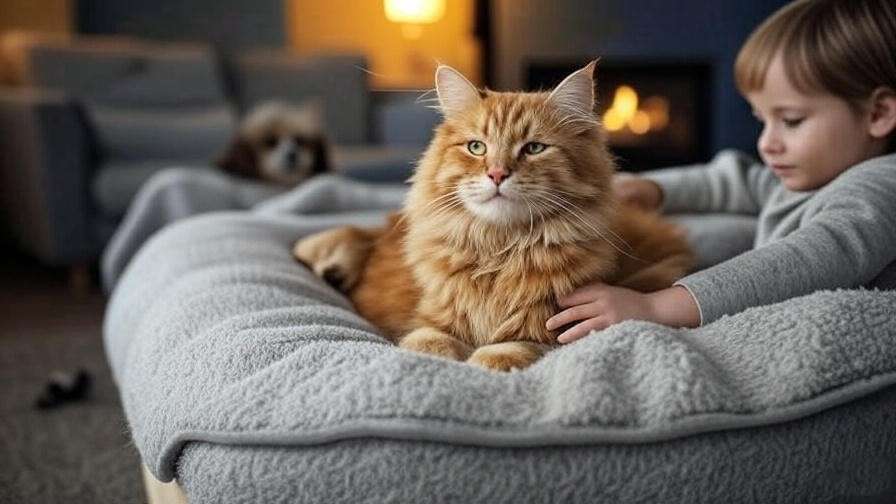
Orange Maine Coons are the social butterflies of the feline world, thriving on interaction with humans, other pets, and even strangers. Their “gentle giant” nickname stems from their affectionate, laid-back demeanor, often seeking out companionship rather than solitude. A 2023 study by the American Veterinary Medical Association highlighted Maine Coons as one of the most sociable breeds, with owners reporting frequent displays of loyalty, such as following their humans from room to room.
To nurture this social side, spend quality time engaging with your orange Maine Coon daily. Simple activities like talking to them (they often respond with chirps!) or playing fetch can strengthen your bond. For households introducing new pets or people, gradual socialization is key. Start with short, supervised interactions, using treats to create positive associations. A Maine Coon owner shared on a popular cat forum how their orange Maine Coon, Ember, took just a week to befriend a new puppy by using this approach.
If your Maine Coon seems withdrawn, it could signal stress or health issues. Monitor for signs like hiding or reduced appetite, and consult a vet if these persist. A happy orange Maine Coon will eagerly engage with their environment, making socialization a cornerstone of their care.
Creating a Stimulating Environment
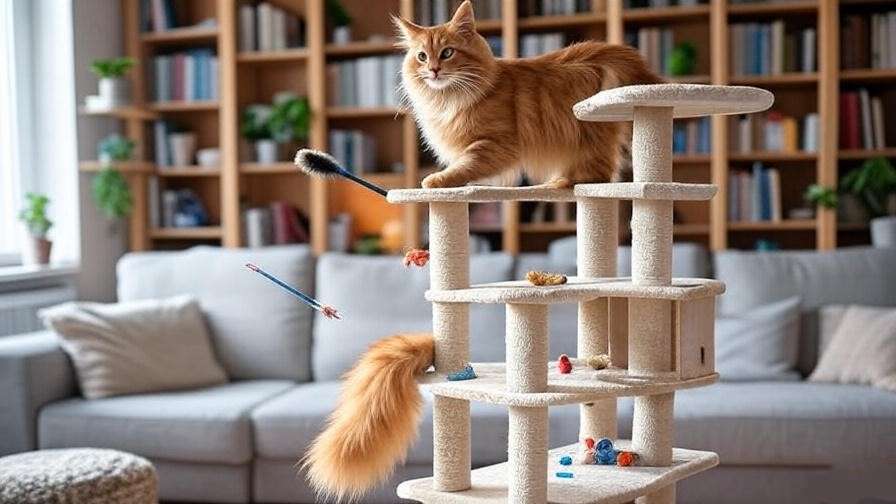
Orange Maine Coons are active and curious, requiring an environment that stimulates both body and mind. Their love for climbing and exploring makes vertical space essential—think tall cat trees, shelves, or window perches. A study in Applied Animal Behaviour Science found that cats with access to vertical spaces showed lower stress levels, as these areas provide safe vantage points and exercise opportunities.
Incorporate enrichment tools like puzzle feeders or treat-dispensing toys to challenge their intelligence. Maine Coons are known for solving puzzles, such as retrieving hidden treats from a ball. Rotate toys weekly to keep things fresh, and consider interactive options like laser pointers or feather wands for play sessions. Outdoor enclosures, if safe and secure, can also satisfy their adventurous spirit, but ensure they’re protected from predators and harsh weather.
Checklist: Essentials for a Maine Coon-Friendly Home
- Tall cat tree (at least 5 feet) with multiple platforms
- Scratching posts to protect furniture
- Puzzle feeders or interactive toys
- Cozy beds in quiet, safe spots
- Pet fountain for fresh water
- Window perches for bird-watching
Creating this environment not only keeps your orange Maine Coon happy but also reduces destructive behaviors like scratching furniture or excessive vocalization.
Training and Bonding with Your Orange Maine Coon
Training Tips for Maine Coons
Orange Maine Coons are highly trainable, thanks to their intelligence and eagerness to please. Unlike many cats, they can learn tricks like sitting, coming when called, or even walking on a leash. Positive reinforcement—using treats, praise, or play—works best. Dr. Carlo Siracusa, a veterinary behaviorist at the University of Pennsylvania, emphasizes that consistency and patience are key when training cats, as they respond to rewards rather than punishment.
For leash training, follow these steps:
- Introduce the Harness: Let your cat sniff and wear the harness indoors for short periods, rewarding with treats.
- Attach the Leash: Once comfortable, clip on a lightweight leash and let them drag it around (supervised).
- Practice Indoors: Guide them gently, rewarding movement in the desired direction.
- Go Outdoors: Start with short outdoor sessions in a quiet area, gradually increasing duration.
Litter box training is typically straightforward for Maine Coons, but ensure the box is large enough for their size (at least 1.5 times their body length). If accidents occur, rule out medical issues like urinary tract infections before addressing behavioral causes.
Building a Strong Bond
Bonding with your orange Maine Coon is a rewarding experience, as their affectionate nature makes them eager companions. Daily playtime, grooming sessions, and even casual conversations strengthen this connection. Maine Coons are uniquely vocal, often responding with trills or chirps, which owners can mimic to “talk back.” A heartwarming story from a Maine Coon owner described how their orange cat, Mango, would curl up next to them during movie nights, purring loudly as they stroked its fur.
Incorporate bonding into your routine by setting aside 15–20 minutes daily for focused interaction. Use toys like feather wands or balls to engage their hunting instincts, or try brushing their coat while speaking softly. These moments build trust and make your Maine Coon feel secure.
Expert Insight: Dr. Mikel Delgado, a certified cat behavior consultant, notes, “Maine Coons thrive on predictable routines and human attention. Regular, positive interactions create a bond that reduces stress and enhances their quality of life.”
Common Challenges and Solutions
Addressing Excessive Shedding
Shedding is a reality with orange Maine Coons, given their thick, double-layered coats. While regular grooming helps, excessive shedding can signal dietary deficiencies or stress. Ensure their diet includes omega-3 fatty acids and consult a vet if shedding seems abnormal. Vacuuming pet hair regularly and using lint rollers on furniture can keep your home manageable.
For stubborn mats, use a detangling spray and work gently with a comb. Avoid cutting mats with scissors, as this risks nicking the skin. If shedding overwhelms your grooming routine, a professional groomer can provide a “lion cut” to reduce fur temporarily, though this should be a last resort.
Handling Vocalization and Attention-Seeking
Orange Maine Coons are famously vocal, using chirps, trills, and meows to communicate. While charming, excessive vocalization may indicate boredom or a need for attention. Address this by increasing playtime and providing enrichment, like puzzle toys or window perches. If vocalization persists, especially at night, ensure their basic needs—food, water, clean litter—are met.
Avoid reinforcing attention-seeking by only responding when they’re quiet. For example, if your Maine Coon meows for food, wait for a moment of silence before filling their bowl. This teaches them that calm behavior gets results.
FAQs About Orange Maine Coons
Q1: Are orange Maine Coons more prone to specific health issues?
A: Orange Maine Coons share the same breed-specific risks as other Maine Coons, like HCM and hip dysplasia. Their lighter coat may increase sensitivity to sunburn, so use pet-safe sunscreen for outdoor cats.
Q2: How often should I groom my orange Maine Coon?
A: Brush 2–3 times weekly to prevent matting and reduce shedding. Bathe every 4–6 weeks with a cat-safe shampoo to maintain coat health.
Q3: What’s the best diet for an orange Maine Coon kitten?
A: Choose a high-protein, nutrient-dense kitten formula with DHA for brain development. Feed 4–5 small meals daily, transitioning to adult food around 12 months.
Q4: How can I tell if my Maine Coon is stressed or unhappy?
A: Look for hiding, reduced appetite, excessive grooming, or aggression. Address stress with enrichment, routine, and a vet visit to rule out health issues.
Q5: Are orange Maine Coons good with kids and other pets?
A: Yes, their friendly, adaptable nature makes them great with children and pets, provided introductions are gradual and supervised.
Conclusion
Your orange Maine Coon is more than a pet—they’re a vibrant, loving companion who deserves tailored care to shine. From regular grooming to prevent matting, to a high-protein diet supporting their large frame, to an enriched environment fueling their curiosity, every step you take enhances their health and happiness. By addressing breed-specific health risks, like HCM, and nurturing their sociable nature, you’ll ensure your Maine Coon thrives for years to come.
Implement these expert-backed tips to see your orange Maine Coon flourish. Share your own stories in the comments below, or explore our related articles on Maine Coon kitten care and top cat foods for large breeds. Here’s to the joy of living with a fiery-furred gentle giant!

